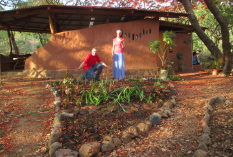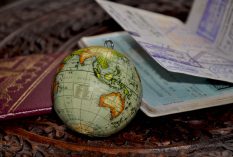Travelling the world is not a cheap undertaking, and saving up for that dream trip is, for most, not an easy thing to do. So what could be worse than frittering away a chunk of your hard-earned budget on unnecessary expenses? Admittedly, quite a few things. Regardless, here are some tips on how to save money when travelling.
It’s Your Money
But that friendly bank you have trusted with it are now going to charge you for the privilege of using it abroad, be that from an ATM withdrawal or a card purchase. Some banks charge more than others, and their own rates may even vary from account to account, so you need to shop around if you plan to be using your debit or credit card abroad. Opening a new account specifically for your trip is not uncommon, and credit cards tend to offer better rates than debit cards.
Another option is a pre-paid traveller’s card. These are kind of like a modern-day travellers cheque (honestly, that was once a thing) where you add money to it from your bank account, and offer security and convenience, as well as decent rates.
When exchanging cash, and even the most long-term of travellers should really have some local currency for their first destination before leaving, the advice ‘do not wait until you get to the airport’ really cannot be overstated. Besides the rates being predictably awful, why give yourself one more thing to worry about for when you’ve just taken a long-haul flight, picked up your hulking backpack and are now trying to find where the local buses leave from? With the amount of time it took to plan your trip, not arranging a trip to the Post office at some point is unforgivable.
Sky High Prices
Speaking of airports, money exchange isn’t the only way you can waste your money. In this age of the low-cost airline, certain strategies are being used to keep prices down. One such tactic sees your flight arriving at an airport further away from your intended destination than you may have thought. It’s sneaky, but you can use it to your advantage if saving money is king. When searching for a flight, always check for ‘all airports’. New York City, for example, is served by three major airports. JFK may be the most famous, but you don’t necessarily need to use that one.
Airlines, especially the budget ones, also seem to like charging you extra for pretty much anything, while everyone knows that anything you buy in the airport will be more expensive than if bought outside. A few handy hints can still save you a small sum though. The restrictions on taking liquids through airport security do not extend to food. If you know you will want to eat while waiting for your plane, or even while flying, take something with you. You can also take an empty water bottle through with you, as airports in some countries provide a drinking water fountain in the departure lounge. Filling your bottle from that will save you buying an overpriced new one.
Many airlines also don’t restrict the weight of your hand luggage, only giving guidelines as to its size. If your check-in luggage is near the limit, put whatever heavy things you can in your hand luggage. I’ve never seen anyone’s hand luggage being weighed.
Sleeping Arrangements
Whatever standard of accommodation you have in mind, there are ways to save. Your hotel will love you if you accept their listed price without question. Ask them for a discount. You might get a slightly smaller room, or not such nice view. But if you don’t ask, you might get this anyway for full price. Hotels would rather sell a room for slightly below their asking price than have it left empty.
Hostels these days offer private rooms too, and are a cheaper alternative to hotels while offering much the same standard of accommodation. If they have a bar too, it will most likely be cheaper than a hotel bar, or even regular bars in the city. They are also great places to meet people.
Free accommodation is also possible for those willing to perhaps not sleep in a bed. Couch Surfing is a website that matches people offering somewhere to rest your head with people who are looking for it. It’s also a way to meet someone local and perhaps gain some inside information about the place you are in.
No Such Thing As a Free Lunch
But it should be cheaper than dinner. For people who love their fine dining, remember that set meals offered by restaurants are often cheaper at lunchtime than in the evening. Filling your belly earlier in the day is also a good way to save money later, as you will need to buy less food for the rest of the day.
Go Local
The easiest and most fun way to save money on food, and anything else, is by going local. You know that these people don’t earn much money. So they must be living cheap, right? While it’s no secret that many places have a local price and a tourist price, you will still be paying less for your noodles on the street than you would for a burger in that bar, less for a local bus than you would for a taxi, and less for your fruit from the man with a barrow than you would pay in the supermarket.
Anything you can get locally, get. It also helps to share the wealth a little, buying from the small business owner who really needs your money rather than from the multi-national who won’t miss it. And if you’re planning on staying in one country for long enough, get a local SIM card for your phone. It will save you money in the long run.
The Best Policy
Insurance is one of the least exciting aspects of travel, but it is one of the most important. Individual policies can be expensive, and it is definitely worth considering annual cover if you take long trips or are away multiple times per year. Check what is covered in your home contents insurance too, as paying extra to cover electronic items already accounted for is pointless.
Not Too Much
Saving money when travelling is no different to most things. Preparation and common sense will take you a long way. Bear in mind the tips above, but know too that there are many other ways to save money on almost every aspect of travel. Perhaps more importantly though, don’t overdo it. You’re trying to have the time of your life, and worrying too much about every penny can impede on that. Save where you can, and spend where you want.
Global Nomadic offers Professional Internships, Volunteer Projects and TEFL Programmes in 29 countries worldwide. Start travelling your career today!











